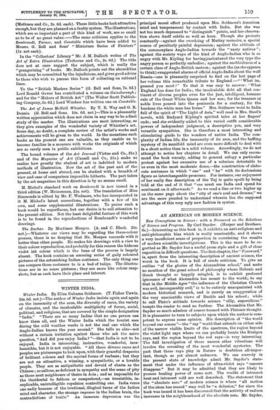WINTER INDIA.
Winter India. By Eliza Ruhama Scidmore. (T. Fisher Unwin. 10s. 6d. net.)—The author of Winter India insists again and again on the immensity of the area, the diversity of races, the variety of climates, and the incalculable multiplicity of forces, social, political, and religious, that are covered by the simple designation "India." "There are so many Indies that no one person can know them all, and the Winter India which the tourist sees during the cold weather weeks is not the real one which the Anglo-Indian knows the year around." She tells us also—not without a dertain irritation against those who ask the naive question, "And did you enjoy India ? "—that India is not to be enjoyed. India is interesting, instructive, wonderful, inex- haustible, but it is not enjoyable. "All these diverse races and peoples are picturesque to look upon, with their graceful draperies of brilliant colours and the myriad forma of turbans ; but they are not an attractive, a winning, a sympathetic, or a lovable people. They are as antipathetic and devoid of charm as the Chinese ; as callous, as deficient in sympathy and the sense of pity as those next neighbours of theirs in Asia ; and as impossible for the Occidental to fathom or comprehend,—an irresistible, in- explicable, unintelligible repulsion controlling one. India vexes one sadly because of the irrational, illogical turns of the Indian mind and character, the strange impasses in the Indian brain, the contradictions of traits." An immense depression was the principal moral effect produced upon Mrs. Scidmore's American mind and temperament by contact with India. But she was not too much depressed to " distinguish " points, and her observa- tion shows itself subtle as well as keen. Though she protests constantly—against the overdoing of Mutiny memoirs, a special source of peculiarly painful depression ; against the attitude of the commonplace Anglo-Indian towards the "nasty natives " ; against the society ways of the kind of Anglo-Indian who is so angry with Mr. Kipling for having;caricatured the very type the angry person so perfectly embodies ; against the snobbishness of a certain class of Anglo-British matron ; against the (as she appears to think) exaggerated alarms of official Anglo-India about the wolf Russia—one is pleasantly surprised to find on the last page of her volume this remarkable tribute to England :—" What im_ pressed you most ? ' To that it was easy to answer : 'What England has done for India ; the incalculable debt all that con- tinent of diverse peoples owes for the just, intelligent, humane rule of the Great White Queen and her son ; for the treasure of noble lives poured into the peninsula for a century, for the burdens the white man has borne." Mrs. Scidmore went to India full of the spirit of "The Light of Asia," well read in Mrs. Steel's novels, with Rndyard Kipling's spirited tales at her fingers' ends ; and she evidently added to this varied outfit considerable powers of independent judgment, a descriptive pen, and very versatile sympathies. She is therefore a most interesting and stimulating guide to the wonders of native India. The com- plexity of Indian life, the immensity of its area, and the baffling mystery of its manifold mind are even more difficult to deal with in a short notice than in a solid volume. Accordingly, we do not attempt to notice her chapters in detail. We can only recom- mend the book warmly, adding to general eulogy a particular protest against her excessive use of a solecism detestable to us even in the most moderate doses,—the construction of elabo- rate sentences in which " one " and " he " with its declensions figure as interchangeable pronouns. For instance, our enjoyment of her really fine description of the Taj is quite spoilt by being told at the end of it that "one must see India and spend his sentiment on it afterwards." As we read a line or two higher up on the same page about the "city of one's soul and dreams," we are the more puzzled to understand wherein lies the supposed advantage of this very ugly new fashion in syntax.






















































 Previous page
Previous page